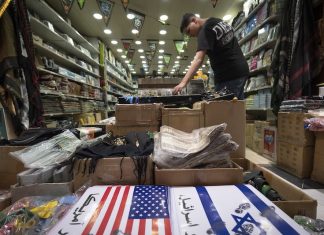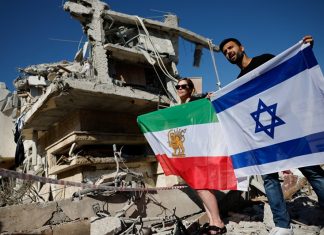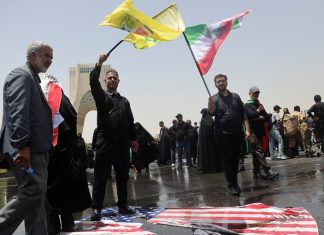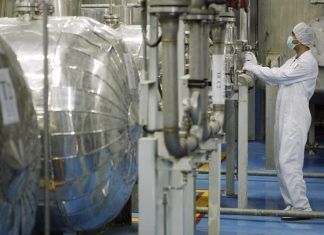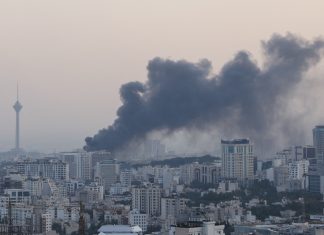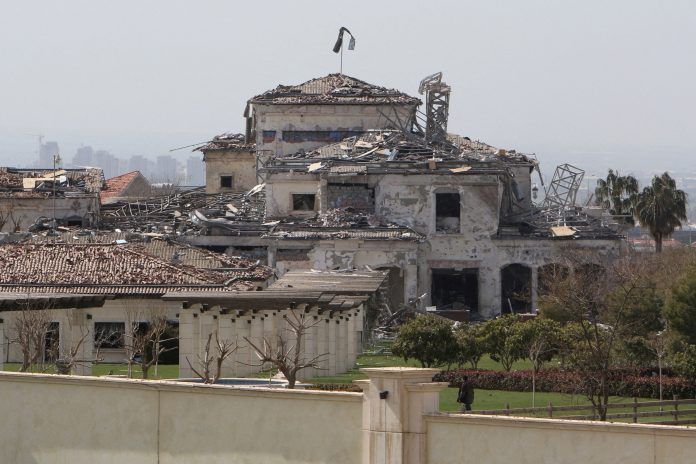
By Ahmad Rafat
The Islamic Republic’s regional adventurism and meddling in Iraqi affairs continue.
On March 13, the Islamic Revolutionary Guards Corps (IRGC) reportedly launched multiple Fateh-10 ballistic missiles from Iran’s northwestern province of East Azerbaijan against the Iraqi Kurdish Regional capital, Erbil.
The attack caused no deaths or injuries but damaged a house belonging to Sheikh Baz Karim Barznji, CEO of the Iraqi Kurdish oil company KAR Group.
The IRGC said that the target was Israel’s “strategic center” in Erbil.
Less than a month later, on April 6, three Russian-made Katyusha rockets, reportedly fired from the Nineveh Governorate, fell near an oil refinery in Kawrkosek, 40 kilometers west of Erbil.
The refinery is operated by the KAR Group.
The Kurdistan Region’s Directorate General of Counter-Terrorism (CTD) said the attack caused no injuries or damage to the refinery complex. According to the CTD, no Iraqi militia group has claimed responsibility for the attack.
Iraqi Kurdish reporter Heydar Erfan told Kayhan Life: “Although the Islamic Republic was behind the missile attacks in March against Karim Barznji’s villa and the offices of Kurdistan 24 TV station and recent rocket attacks on an oil refinery in Kawrkosek, we can assume Vladimir Putin was the architect of the attacks, given he does not want any country to compensate for the global shortage of the Russian oil and gas, caused by severe sanctions imposed on the country after its military invasion of Ukraine.”
Iran Attacks Iraq’s Erbil With Missiles in Warning to U.S., Allies
“The Kurdistan Region can supply oil to Europe through Turkey,” Mr. Erfan explained. “It is in talks to join the Turkey-Israel plan to supply Europe with gas.”
The proposed Turkey-Israel gas pipeline will provide Europe with an alternative to Russian energy supplies. It calls for building an underwater pipeline from Turkey to Israel’s largest natural gas fields, Tamar and Leviathan, off its Mediterranean coastline.
The Tamar and Leviathan gas fields increased output by 25 percent last year. Gas would flow to Turkey through the pipelines and be distributed to its southern European neighbors from there.
Israel exported 5 billion cubic meters of gas to Jordan and Egypt in 2021. It signed a contract with Egypt earlier this year, under which it will increase its gas export to the country by 2.5 billion cubic meters.
The Kurdistan Region has increased its gas output significantly in the past three years.
Dana Gas PJSC, based in the United Arab Emirates (UAE), operates the Khor Mor gas field in Sulaymaniyah Governorate, in Iraqi Kurdistan. It has increased Khor Mor’s gas output by 50 percent, reaching 4.7 billion cubic meters a year.
Dana Gas has invested an additional $630 million to increase the Kurdistan Region’s gas exports to 2.5 billion cubic meters a year, which means another 50 percent jump in production in the Khor Mor gas field.
“The Kurdistan Regional Government (KRG) is considering a plan, which, if passed, would increase gas production in the region to 40 billion cubic meters by 2035,” Heydar Erfan said. “Karim Barznji’s oil company has been involved in constructing a pipeline from the Kurdistan Region to the southern Turkish port of Ceyhan. Iraqi Kurdistan produces 500,000 barrels of oil per day (b/d), 420,000 barrels of that flow through the pipeline to Ceyhan and reaches the global market from there.”
“Officials in Tehran have never supported a move by the Kurdistan Region to increase its oil and gas exports to Turkey, which relies on the Islamic Republic for its energy needs,” Erfan added. “Besides its political pressure [on Iraq], Iran has used missiles and rockets to show its opposition to the idea, given its support for Russia, which is under global sanctions following its military attack on Ukraine.”
“Officials in Tehran threatened and coerced the Iraqi government to withdraw its complaint lodged with the UN Security Council against the Islamic Republic for launching missile attacks from Iranian territory on Erbil,” Erfan concluded.
Emad Bajalan, a leader of the Kurdish Democratic Party (KDP) of Iraq, said: “The Islamic Republic not only refused to respond to the Iraqi government’s inquiries regarding the missile attacks on Erbil, but it has instead warned it will carry out similar operations if [Kurdistan] Region does not reassess its policies.”
Speaking about the purported links between the IRGC’s missile attacks on Erbil and rocket attacks on the refinery in Kawrkosek by militia groups operating under the IRGC’s Qods Force (IRGC-QF) auspices, Kurdish Region’s Prime Minister Masrour Barzani recently said: “We will continue efforts to minimize the impact of the energy shortage in Europe.”

